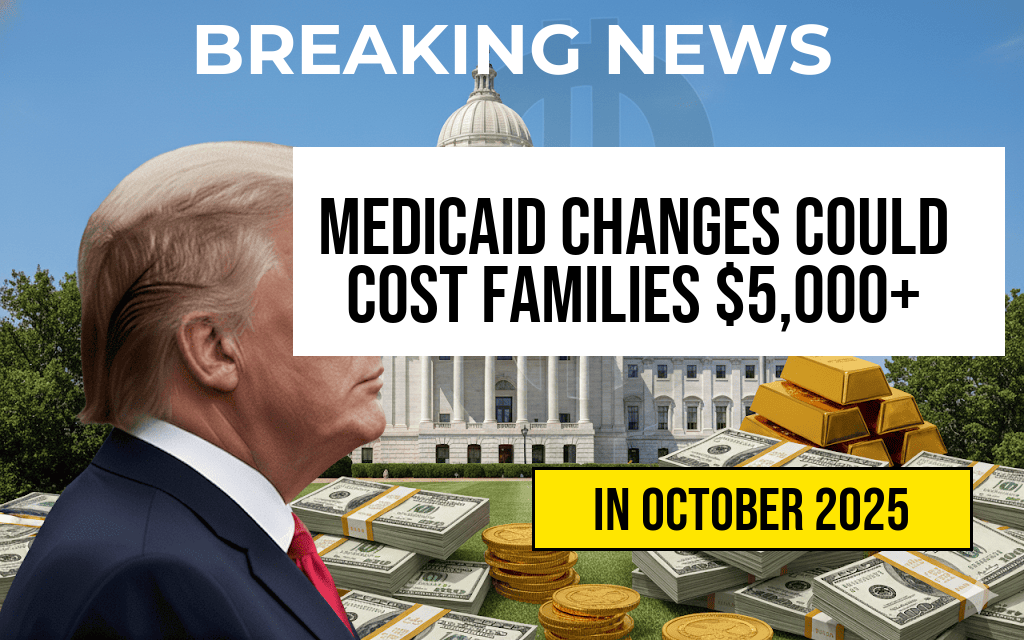Recent changes to Medicaid, the government health insurance program for low-income individuals and families, are projected to significantly increase out-of-pocket medical expenses for many families across the United States. With over 70 million beneficiaries relying on this program for essential health services, the modifications are expected to lead families to incur additional costs exceeding $5,000 annually for medical expenses. The new regulations, set to take effect in 2024, aim to streamline benefits but may inadvertently place a heavier financial burden on those who rely on Medicaid for critical healthcare access.
Understanding Medicaid Changes
The Medicaid program has undergone several adjustments in recent years, particularly in response to the COVID-19 pandemic. These updates include alterations to eligibility requirements, benefit structures, and the introduction of new cost-sharing measures. As states grapple with budget constraints and the demand for services continues to rise, the latest changes are seen as a double-edged sword.
New Cost-Sharing Measures
One of the most notable changes involves the implementation of new cost-sharing measures that will affect how much beneficiaries pay for services. Currently, many Medicaid recipients face minimal or no out-of-pocket costs for essential healthcare services. However, the revised policies will introduce higher co-payments and deductibles, translating to increased financial responsibility for families. This shift raises concerns among advocates who worry that it may discourage individuals from seeking necessary medical care.
Impact on Families
Families with children, the elderly, and individuals with chronic illnesses are expected to be particularly affected by these changes. For instance, a family of four earning just above the federal poverty line may find themselves facing burdensome costs for essential services such as pediatric care, mental health support, and prescription medications. The following table outlines the projected increase in out-of-pocket expenses for various family scenarios:
| Family Type | Current Annual Expenses | Projected Annual Expenses (2024) | Increase |
|---|---|---|---|
| Single Parent with One Child | $2,500 | $7,500 | $5,000 |
| Family of Four | $3,000 | $8,000 | $5,000 |
| Elderly Couple | $4,000 | $9,500 | $5,500 |
Advocacy and Concerns
Healthcare advocates and policymakers are voicing their concerns regarding the implications of these changes. Many argue that increasing out-of-pocket costs may deter families from seeking preventive care, which can lead to more severe health issues down the line and ultimately higher healthcare costs for everyone. Additionally, there are worries about the potential for rising medical debt and the overall impact on public health outcomes.
Several advocacy groups are mobilizing efforts to address these concerns, urging lawmakers to reconsider the implications of the changes. Organizations such as the Kaiser Family Foundation are conducting research to analyze the long-term effects these changes may have on vulnerable populations.
What Families Can Do
As families prepare for these upcoming changes, there are several steps they can take to mitigate the financial impact:
- Stay Informed: Understanding the specifics of the changes can help families plan accordingly.
- Explore Additional Coverage: Families may want to look into supplemental insurance options that can help cover unexpected medical expenses.
- Utilize Community Resources: Many communities offer programs and resources to help families access affordable care and financial assistance.
Looking Ahead
The upcoming Medicaid changes present a significant challenge for many families who depend on this vital program for healthcare access. As discussions continue among legislators and advocates, the focus remains on ensuring that quality healthcare remains affordable and accessible for all Americans. Stakeholders are encouraged to participate in ongoing conversations about healthcare reform and to advocate for policies that prioritize the health and well-being of vulnerable populations.
For more information on Medicaid and its impact on families, visit Medicaid.gov or explore articles from Forbes.
Frequently Asked Questions
What are the recent Medicaid changes affecting families?
The recent Medicaid changes involve policy adjustments that may result in increased out-of-pocket medical expenses for families, potentially exceeding $5,000 annually.
How will these changes impact out-of-pocket medical expenses?
The changes may lead to higher premiums, co-pays, and deductibles, which can significantly increase a family’s total out-of-pocket medical expenses each year.
Who will be most affected by the Medicaid changes?
Families with lower incomes, particularly those relying heavily on Medicaid for healthcare, are likely to be most affected by these changes, experiencing greater financial strain.
What can families do to prepare for increased medical costs?
Families can prepare by reviewing their Medicaid coverage, exploring alternative insurance options, and budgeting for potential increases in healthcare expenses.
Are there any resources available for families struggling with Medicaid changes?
Yes, families can seek assistance from local health organizations, financial advisors, or Medicaid advocacy groups that offer support and guidance during these transitions.






